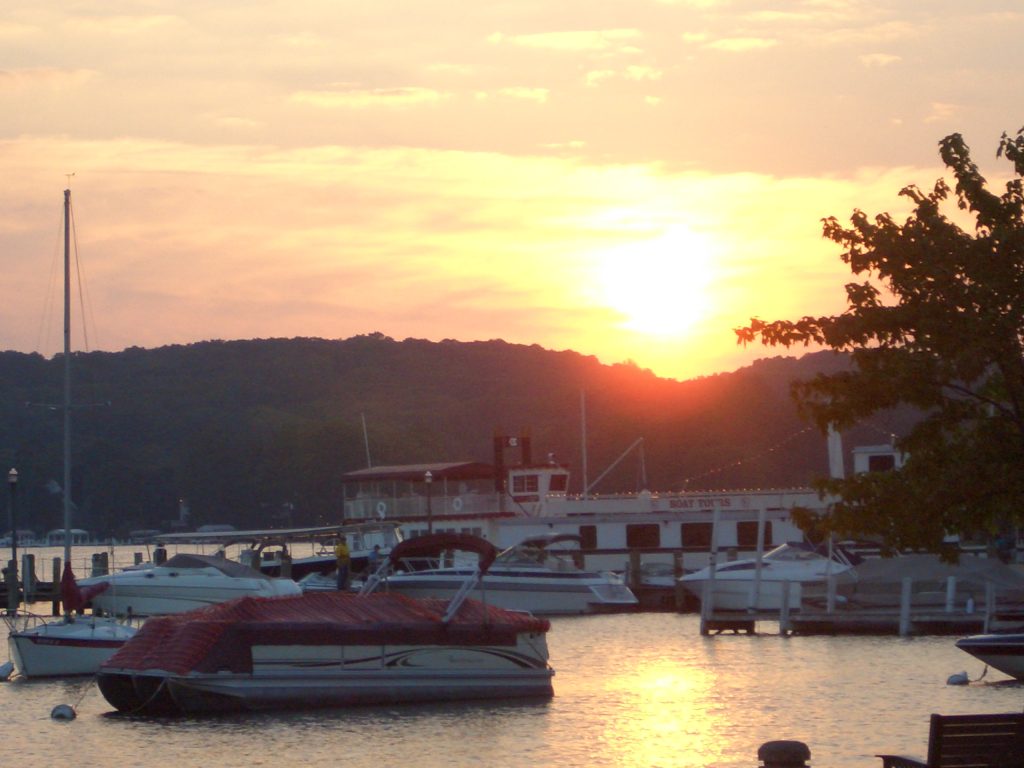Invasive Mussels Found in Inland Wisconsin Lake For First Time
Quagga mussels discovered in Geneva Lake during routine monitoring.

John Bracken (CC-BY)
This summer, interns for the Geneva Lake Environmental Agency were doing routine research at Geneva Lake when they discovered several unusual mussels.
They looked similar to zebra mussels, a common invasive species in Wisconsin’s waters since the 1980s. The agency contacted the Wisconsin Department of Natural Resources, whose scientists confirmed the mussels were part of a more recent invasive wave: they were quagga mussels.
But Geneva Lake is Wisconsin’s first inland lakes with a confirmed population of the invasive mollusk.
“We did date a few of those, or age a few of the quagga mussels, and the ones that have looked at a little more closely are around two or three years old, so they’ve been there, but we just haven’t detected it until this year,” said Amy Kretlow, the DNR’s aquatic invasive species program coordinator.
A more resilient invader
Jake Vander Zanden directs UW-Madison Center for Limnology — the study of lakes. He says both zebra and quagga mussels feed on phytoplankton, the base of the aquatic food chain.
“In effect, what they do is they will undermine the basis of the food web, and that can have impacts on fisheries,” Vander Zanden said. He added that the mussels create good conditions for algae growth, which gets smelly when washing up on beaches.
Lisie Kitchel monitors Wisconsin’s native mussel species for the DNR. She said both invaders literally grow onto native mussels.
“When I’m diving in the Mississippi River, if I come up with a ball of zebra mussels, I know that when I break that open I’m either going to have a snail or a mussel — a native clam — inside that ball of zebra mussels,” she said.
However, there is a key difference between the two invaders: while zebra mussels need hard surfaces like piers or rocks to latch onto, quagga mussels are able to grow on soft lake bottoms.
Lake bottoms are a mix of hard surfaces like stone and soft surfaces like sand and mud. “Most lakes are mostly soft bottom. So as an example, we look at Lake Mendota and it’s about 5 percent hard bottom. 95 percent soft bottom,” Vander Zanden said.
Vander Zanden expects quaggas to be better than zebra mussels at colonizing Wisconsin’s largely soft-bottom inland lakes.
Unexpected effects on ecosystems
Not all native species are equally impacted by invasive mussel colonies.
“Freshwater drum, also known as sheephead, pumpkin seed sunfish, carp, they’re capable of feeding on zebra mussels, so they thrive. And of course, there are the species that don’t feed on zebra mussels, and they don’t,” Vander Zanden said.
“In the Mississippi River, the carp switched over to eating zebra mussels,” Kitchel said. But invasive mussels have less caloric value than native ones.
“What they have found over time, in the presence of zebra mussels, is that the carp, for the same length of carp, they are lighter, they’re not weighing as much,” she said.
Some native species develop defenses against invasive mussels.
Kitchel said native mussels sometimes bury themselves into lake and river bottoms when under attack from invasive ones.
“(The invasive mussels) can’t survive, because they can’t siphon and get in oxygen, and get in their food and things like that, whereas our native mussels can, quote unquote, ‘clam up,’ and just go down for the duration and then come back up,” she said.
Recreational boats thought to spread invasive mussels
According to the DNR, quagga mussels often spread in boats’ bilge water or livewells. They can also hitch rides from lake to lake in bait buckets.
In a May report, Wisconsin’s Green Fire noted that wake boats could be particularly efficient at spreading quagga mussels given their large ballast and bilge capacities. The boats are increasingly under scrutiny for their effects on erosion and the spread of invasive species.
Quagga mussels found in Wisconsin inland lake for first time was originally published by Wisconsin Public Radio.
If you think stories like this are important, become a member of Urban Milwaukee and help support real, independent journalism. Plus you get some cool added benefits.






















Of course it was Geneva Lake. Why isn’t that surprising to me?
A couple days ago the Journal posted an article on the current yellow perch population in Lake Michigan. They stated
“In 2023 anglers in the Wisconsin waters of Lake Michigan from Kenosha to Door counties landed 2,353 perch, according to the DNR. The catch included 473 perch in Kenosha County, 596 in Racine County and just nine in Milwaukee County.To put those angler catches in perspective, in 1988 sport anglers caught 869,164 perch in the lake, including 133,328 in Kenosha, 213,163 in Racine and 408,438 in Milwaukee counties.
The Lake Michigan yellow perch population continues to struggle to recover after a significant decline in the 1990s. The drop, marked by a lack of recruitment, or survival of young perch, coincided with a rapid increase in zebra and quagga mussels in the lake”.